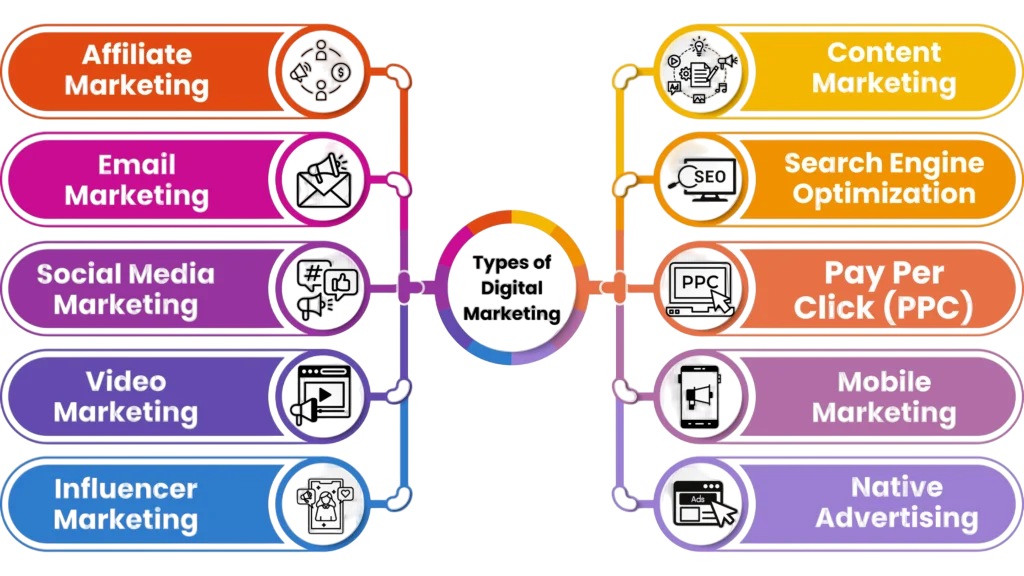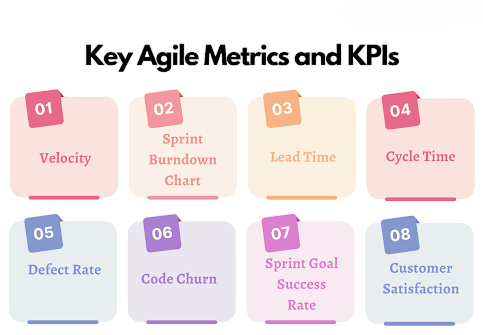
- Introduction to Digital Marketing Projects
- Importance of Digital Marketing Projects
- Types of Digital Marketing Projects
- How to Plan a Successful Digital Marketing Project
- Execution Strategies for Digital Marketing Projects
- Tools and Platforms for Managing Digital Marketing Projects
- Measuring Success: Metrics and KPIs
- Common Challenges in Digital Marketing Projects
- Future Trends in Digital Marketing Projects
- Conclusion
Introduction
Digital marketing projects focus on collaborating to promote a brand, product, or service through online platforms. These efforts aim to connect with specific audiences, spark their interest, and motivate them to take action. A variety of digital marketing strategies and tools are available today to achieve this from SEO and PPC to email automation, content marketing, and social media management platforms core components explored in Digital Marketing Training, where learners gain hands-on experience with tools like SEMrush, Mailchimp, Hootsuite, and Google Analytics to build, optimize, and scale campaigns across diverse digital channels. What distinguishes projects from ongoing marketing efforts is their clear structure. Each project has specific goals and a timeline that defines when tasks need to be completed and what the expected results are. This structure helps businesses concentrate their efforts and try out new ideas. With defined deliverables, companies can monitor their progress and evaluate the effectiveness of their strategies. This approach is essential for driving targeted business growth. Overall, digital marketing projects offer a strong way to use online resources and strategies to meet specific goals, ultimately leading to success in the competitive digital environment.
Ready to Get Certified in Digital Marketing? Explore the Program Now Digital Marketing Online Training Offered By ACTE Right Now!
Importance of Digital Marketing Projects
Digital marketing projects help organizations stay flexible while also enabling innovation and accurate outcome measurement. By engaging in these projects, businesses can encourage teamwork among staff, allocate resources wisely, and track their progress over time. This structured method makes sure that all marketing efforts align with the overall goals of the company. Additionally, these projects foster an environment where people can share and develop ideas, leading to new strategies and tactics an approach amplified by Social Media Influencers, whose collaborations help brands unify messaging, spark creative innovation, and co-create campaigns that resonate deeply with target audiences while driving measurable business outcomes. The ability to closely monitor results allows businesses to learn quickly and adjust their plans as necessary, improving their chances of success. In essence, well-organized digital marketing initiatives are crucial for companies that want to succeed and remain competitive in a constantly changing market. By taking these proactive steps, firms will not only boost their marketing effectiveness but also stay on track to meet their overall business goals. Reaching new heights requires teamwork and innovation, which well-structured projects can easily incorporate into any organization’s workflow.
Types of Digital Marketing Projects
- Social Media Marketing Projects: These projects focus on creating, scheduling, and optimizing social media content across platforms like Facebook, Instagram, LinkedIn, and TikTok. Typical goals include brand awareness, engagement, lead generation, or community building. Examples: launching a hashtag campaign, influencer collaborations, or social contests.
- Search Engine Optimization (SEO) Projects: SEO projects aim to improve a website’s organic search rankings through keyword research, on-page optimization, technical fixes, and link-building campaigns. These projects often involve audits, content revamps, and monitoring search performance. Examples: optimizing a new website for search, recovering from a Google penalty.
- Content Marketing Projects: Content marketing projects involve creating valuable content such as blogs, whitepapers, infographics, or videos that attract and educate a target audience. The focus is on providing solutions that build trust and authority. Examples: launching an industry blog, creating an ebook series, developing a content hub.
- Pay-Per-Click (PPC) Advertising Projects: PPC projects center around setting up and optimizing paid ads on platforms like Google Ads, Facebook Ads, or LinkedIn Ads. Key activities include keyword bidding, ad copywriting, landing page design, and A/B testing. Examples: running a seasonal sale campaign, launching a new product with paid ads.
- Email Marketing Projects: These projects focus on designing email campaigns that nurture leads, announce promotions, or build customer loyalty. Elements include list segmentation, personalized content, and automation workflows. Examples: onboarding drip campaigns, re-engagement emails, holiday newsletters.
- Influencer Marketing Projects: Influencer projects involve collaborating with influential personalities to promote products or services. Tasks include identifying influencers, negotiating partnerships, and measuring campaign impact. Examples: Instagram takeovers, product reviews, co-created content.
- Affiliate Marketing Projects: Affiliate projects manage partnerships where affiliates promote products in exchange for commissions. This includes recruiting affiliates, creating promotional materials, and tracking sales. Examples: launching an affiliate program for an ecommerce store.
- Video Marketing Projects: Video projects focus on producing and distributing videos to engage audiences. They may involve scripting, filming, editing, and promotion across YouTube, social media, or websites. Examples: explainer videos, live webinars, product demos.
- Setting Clear Objectives: Define what the project aims to achieve using SMART goals (Specific, Measurable, Achievable, Relevant, Time-bound). Clear objectives guide every step of the project.
- Research and Audience Analysis: Understand your target audience’s behaviors, needs, and pain points. Use data analytics, surveys, and competitor analysis to inform strategy.
- Budgeting and Resource Allocation: Estimate costs for tools, ads, content production, and human resources. Allocate budgets realistically and track spending.
- Timeline and Milestones: Create a detailed project timeline with milestones to monitor progress and ensure timely delivery.
- To manage and improve our business performance, we need to track several key performance indicators (KPIs). These include important metrics like website traffic, which shows how many visitors we attract, and conversion rates that reveal the percentage of those visitors who take desired actions, such as making a purchase.
- Additionally, monitoring click-through rates (CTR) helps us understand how effective our marketing efforts are at engaging potential customers. We should also pay close attention to return on investment (ROI) to assess the financial effectiveness of our spending. Engagement metrics provide insight into how users interact with our content, while customer acquisition cost (CAC) tells us how much we invest to gain new customers.
- Project management often presents challenges that can complicate the process and hinder success. One issue is scope creep, where the project’s requirements expand beyond the original plan without proper assessment. Another common problem is unclear objectives, which means goals are not well defined and can create confusion among team members.
- Additionally, budget overruns happen when project expenses exceed the original allocation, leading to financial strain. Poor communication within the team can also pose significant obstacles, resulting in misunderstandings and a lack of collaboration. Lastly, the fast pace of change in digital trends can make it tough to keep up and adjust effectively.

To Explore Digital Marketing in Depth, Check Out Our Comprehensive Digital Marketing Online Training To Gain Insights From Our Experts!
How to Plan a Successful Digital Marketing Project
Execution Strategies for Digital Marketing Projects
Achieving success in any project requires the whole team to collaborate. Team members must work together effectively and communicate openly about progress and challenges. Clear communication helps ensure everyone understands the situation, which is crucial for moving forward smoothly a foundational skill emphasized in Digital Marketing Training, where learners develop collaborative workflows, practice active listening, and implement structured communication protocols to align teams, reduce missteps, and drive consistent execution across digital campaigns. To respond to changes and unexpected obstacles, it’s important to make quick adjustments based on real-time feedback. This means being flexible and finding solutions as issues come up. Using project management frameworks like Agile or Kanban can help with this process. These frameworks support adaptability and help manage tasks efficiently. Maintaining a strong focus on quality control throughout the project is also important. Regularly checking and testing the work helps catch potential issues early, ensuring that the final result meets the desired standards. This commitment to quality leads to a successful end product.
Looking to Digital Marketing Training? Discover the Digital Marketing Expert Masters Program Training Course Available at ACTE Now!
Tools and Platforms for Managing Digital Marketing Projects
There are many useful tools available today that can improve your project management and marketing efforts. For project management, popular options include Trello, which has an easy-to-use interface for tracking tasks. Asana is known for its strong features that encourage team collaboration. Monday.com offers a platform that can be customized for different workflows. In terms of analytics, tools like Google Analytics are great for tracking website performance in detail a core capability emphasized in Social Media Marketing Skills to Grow, where marketers learn to interpret traffic sources, measure conversions, and analyze user behavior across social platforms to refine strategy, prove ROI, and optimize content for audience engagement. SEMrush provides valuable insights into SEO and online competition. Ahrefs is another strong choice for examining site metrics and backlink strategies. For managing social media, Hootsuite lets you schedule posts on multiple platforms while tracking engagement rates. Buffer is also popular for its simple scheduling features and performance analytics.
Measuring Success: Metrics and KPIs

Preparing for Digital Marketing Job Interviews? Have a Look at Our Blog on Digital Marketing Interview Questions and Answers To Ace Your Interview!
Common Challenges in Digital Marketing Projects
Future Trends in Digital Marketing Projects
The future trends in marketing show a strong shift toward AI-driven personalization. This means businesses will increasingly tailor their content and offerings to individual preferences and behaviors, making the customer experience more relevant and engaging. We can expect a greater focus on video and interactive content. Video has become one of the most powerful tools for communication and engagement, allowing brands to connect with their audience in dynamic ways a transformative medium at the heart of Digital Business, where companies leverage storytelling, emotional resonance, and platform-specific strategies to boost visibility, drive conversions, and build lasting relationships through immersive video content across YouTube, Instagram, and branded microsites. Interactive content, like polls and quizzes, invites participation and makes the user experience more enjoyable. Optimizing for voice search will also be crucial. As more people use smart speakers and voice assistants, companies need to ensure their content is easy to find through voice commands. This requires a different approach to SEO strategy than many have used in the past.
Conclusion
Digital marketing projects help businesses innovate and connect with their audiences while driving growth. These projects vary in type, and understanding them is vital for success. First, planning is important. A solid plan lays the groundwork for any digital marketing effort. This means setting clear goals, identifying target audiences, and figuring out the best platforms and methods to reach those audiences effectively core strategic steps emphasized in Digital Marketing Training, where learners master audience segmentation, platform evaluation, and goal alignment to build targeted campaigns that maximize reach, engagement, and ROI across diverse digital channels. A successful project needs careful attention to the available resources, budget, and timeline for execution. Once planning is done, the next step is to carry out the plan effectively. This involves implementing the tactics outlined, whether that’s creating engaging content, using social media, or running targeted ads. Each part must work together smoothly to deliver a clear and powerful message. After execution, measuring results is crucial. Marketers should assess their campaign performances with analytics tools to determine what worked and what didn’t. This evaluation provides insights into audience engagement and the overall effect of the project on business goals.




